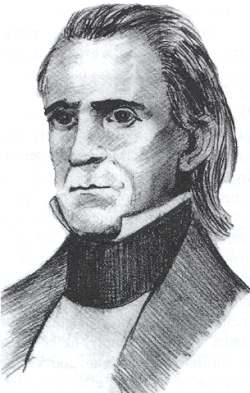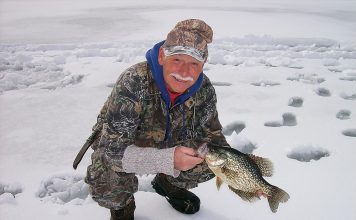 |
|
| Issue #32 • March/April, 1995 |
It was snowing and three of us were up at the office. Dave Duffy, the fellow who publishes BHM, and I were trying to get some work done on this issue. His friend, O.E. MacDougal, had dropped by that morning.
Mac was on his way from Seattle to his home in Ventura, California. Dave invited him to stay the night and wait out the storm. Mac’s a poker player by trade and he goes where the games are. He said he’d had a bad week up in Seattle but he didn’t seem particularly bothered by it. He said it happens from time to time.
“Silveira,” Dave said, “I want you to read this when I get done.”
He was at his computer composing his editorial. I was taking a break and working a crossword puzzle. “Twenty-one down…four letters for ‘The man who stole Mexico.’ First letter is…”
“James Polk,” Mac said. “P-O-L-K.”
I wrote in P-O-L-K. “Thanks.”

James K. Polk
Dave didn’t look up from his computer. “Who’s James Polk?”
“That’s what his opponents were asking in the 1844 presidential election,” Mac said.
“Asking what?”
“‘Who’s James Polk?’ People were asking it then and they’re still asking it now.”
“Well, who was he?”
“The eleventh president of the United States.”
Dave stopped and looked up at the ceiling for a moment. “Oh yeah, Polk. Now I remember the name.” He looked back at Mac. “How could they not have known who he was?”
“Well, they knew who he was. What they were doing was pointing out that most of the country didn’t. He was almost unknown outside of Tennessee and he was the first dark horse candidate in American presidential politics.”
“Oh,” Dave said and went back to typing.
“Is he a guy our readers would find interesting?” I asked.
“No,” Dave said.
“I was asking Mac.”
“The answer’s still no.”
“Why not?”
“Nobody would know who you were talking about.”
“Is that true?” I asked Mac.
“Probably.”
I shrugged and went back to my puzzle. “Seven letter word. Northerly flowing river in Venezuela, fifth letter…”
“Orinoco,” Mac said.
“Sounds like Mac’s doing the puzzle,” Dave said without looking up.
“Which issue are you guys working on?” Mac asked.
Dave looked at his schedule. “March/April.”
“March 3rd will be the sesquicentennial of Polk’s inauguration.”
“Sesquicentennial?” he asked.
“150 years since he was inaugurated.”
“Wait a minute, presidents are inaugurated in January.”
“January 20th. But that’s today. They used to be inaugurated in March. The 20th Amendment changed it in 1933 and now it’s about six weeks earlier.”
Dave finally turned away from his computer. “How come you know the sesquicentennial of his inauguration is coming up?”
“I admire the guy. We’ve had 41 presidents and he was one of the best and absolutely the most underrated.” He went back to reading.
“How do you spell Orinoco?” I asked.
“Tell me a little bit about him,” Dave interrupted.
Mac placed his book on his lap. He was thinking. “James Knox Polk,” he stood up and grabbed the World Almanac from the bookcase. “I can’t remember exactly when he was born.” He leafed through it. “November 2, 1795 in Mecklenburg County, North Carolina. He died June 15, 1849 in Nashville, Tennessee.”
He put the almanac back on the shelf and sat down. “He only served one term but, by the time he left office he’d fought a war and won it, he’d settled the two major economic issues of his daythe national bank question and tariff reform, and he added more territory to the United States than any other president before or since1.2 million square miles, about one third of what the United States is now…”
“I thought the Louisiana Purchase was the biggest addition,” Dave said.
“It was the largest single acquisition by the United States, but altogether Polk added half again as much land to this country as Jefferson did. He added Texas, the so-called Mexican Cession, the Oregon Territory, and northern Maine. It was more land than most of history’s greatest conquerors conquered. In fact, it was because of his desire to increase the size of the United States that the Democrats chose him to run for the presidency over more likely candidates, including Martin Van Buren, who had been the eighth president. It’s also the reason he beat Henry Clay, the Whig candidate, one of the best known politicians of his day.”
“How come you never hear of him today?”
“I don’t know. He was probably the hardest working president we’ve ever had and he was certainly one of the most effective. He’s a model modern presidents should emulate.”
“Well, with all you say he got done, he must have cost the country a fortune.”
“Hardly. He strove for economical government and made serious and effective moves to pay off the national debt he’d inherited.
“He was also a man with an astounding memory and an uncanny ability to grasp the intricacies and details of complex organizations and situations. But his biggest asset was his incredible capacity for hard work. As a result, he had a grasp of the workings of the various bureaucracies under him that exceeded that of the men who ran them, and he often oversaw their workings.
I put my puzzle down. “I think we should consider an article about him,” I said.
Dave still looked skeptical.
“What do you think?” I asked Mac.
“It would be interesting. As important as I think he was, I can just about guarantee that no other national magazine is going to carry anything about him. And, on a more practical basis, he’d be timely and your readers would find him interesting. Today we have a situation where the power of the central government is being questioned, and while Polk believed in a strong government, he also believed it had to operate economically and within the bounds of the Constitution. This included respect for the rights of the states. To put it simply, he believed in limited government, and yet he was one of the most effective presidents we’ve ever had.”
That said, he picked up his book again.
“Wait a minute, what else can you tell me about him?” Dave asked.
Mac looked up again. “What do you want to know?”
“I don’t know, start at the beginning.”
He thought a moment. “Okay, the beginning. As a kid, he was too frail and sickly for formal schooling, so he was schooled at home. Homeschooling agreed with him because, when he applied to the University of North Carolina, he was accepted as a second year student and when he graduated he held the highest honors in the school in both the classics and mathematics.
“He sounds like he was pretty sharp,” Dave said.
“He was. After his graduation, he went back to Nashville, passed the bar and, within a year, he was regarded as one of the most capable lawyers in the state of Tennessee.”
“Really?”
Mac nodded.
“What else did he do?”
“He created the Department of the Interior to deal with all the new territory acquired, he established the Naval Academy, and he authorized the Smithsonian. He probably did a lot more, but I don’t remember what.”
“But if no one knew who he was, why did the Democrats choose him to run?”
“The party regulars knew who he was. He’d already served seven terms in the House including two as Speaker of the House. His contemporaries regarded him as very effective in the way he managed the House. He decided most of the procedural questions that came up and his decisions were approved by majorities in both the Democratic and Whig parties. His abilities were never questioned and more importantly neither was his personal integrity.”
“So they knew him as a successful politician,” I said.
“He was at the beginning of his political career but not by the time he ran for the presidency. He’d left his seat in the House to run for the governorship of Tennessee in 1839 and won the first time, but he lost his reelection bids in 1841 and 1843.
“He’d also hoped to be chosen as Martin Van Buren’s running mate in the election of 1840 and, even though Andrew Jackson backed him, he wasn’t selected. In fact, no one was and Van Buren lost to the Whig candidate, William Henry Harrison, and his running mate, John Tyler.
“So the politicians knew who he was, but he was a stranger to the general public,” Dave said.
“That’s right.”
A dark horse
Dave drummed his fingers on the desk.
“What’s that thing you said a few minutes ago mean?” Dave asked.
“What’s that?”
“Dark horse candidate,” Dave said. “Polk wasn’t considered a real contender?”
“Right up until 24 hours before he was nominated, he wasn’t even considered as a candidate.”
“Then why’d they choose him?”
“The leading candidates were Martin Van Buren, Lewis Cass, and James Buchanan. But the Democrats couldn’t settle on any one of them.
“If they’d held the convention in the fall of 1843, as they’d planned, Van Buren would have been a shoo-in. But many of the party members wanted to postpone it until spring, and Van Buren, feeling he’d be nominated anyway, agreed to it. But in the ensuing months, the Texas question came up and crippled his nomination.”
“What did Texas have to do with his nomination?” Dave asked.
“Van Buren opposed annexation and there was growing sentiment to make Texas a state.
“With his nomination bogging down, Cass and Buchanan hoped to be nominated. But Cass couldn’t find enough support, though four years later he would be nominated and lose to the hero of the Mexican War, Zachary Taylor. And Buchanan would be nominated in 1856 and become president. But, in 1844, none of them could get enough delegate support to be the nominee.
“So with the convention deadlocked, they looked around for someone else. There are many reasons they chose Polk. One was Andrew Jackson’s still considerable influence in the Democratic Party, and Polk was Jackson’s choice. The two had been friends for years and Polk had been a Jackson supporter since before Jackson had become president.”
“Yeah, you said Jackson had backed him for the vice presidential nomination in 1840.”
Mac nodded. “Another reason he was chosen was that many of the convention members had served with him in Congress and, figuring he was one of them, they deluded themselves into thinking they could control him. If they’d considered how he’d served in the Househis independence and integritythey might have reconsidered. And the last reason was that during his time in the House, congressmen from both parties found that, even if they didn’t like him, they could trust him.”
“Why didn’t they like him?” I asked.
“Polk wasn’t a man you’d consider charismatic. In fact, he was rather cold. As a result, he came up short in the friends department.”
“So when he was chosen he wasn’t actually expecting the nomination.”
“Not at all. And when he received the news, he surprised everyone by drafting a letter of acceptance in which he committed himself to running for only one term.”
“Why?”
“His health may have been one reason, but there were others. First, he believed four years was enough time for a president to carry out his programs. Second, the Democratic Party was badly split and he hoped that by vowing to run for only one term, he could heal the party rifts. He didn’t realize it would backfire because, with the certainty that he wasn’t going to run again, the most powerful men in the party spent the next four years trying to jockey themselves into position for the nomination in 1848.”
“What were the issues he ran on?” Dave asked.
“With party platforms today, politicians try to please everybody. But Polk ran on just four issues: to lower the tariff, to create an independent monetary system, to settle the Oregon question, and to annex Texas and the Southwest.”
“That Texas question again,” Dave said.
“Right. It was a big issue. Do either of you guys know how Texas became a state?”
We shook our heads.
The Texas question
“Texas had been part of one of the Spanish colonies. It was part of what Spain called New Spain. New Spain ran from the Yucatan in southern Mexico all the way up to Oregon. After the Mexicans overthrew the Spanish, early in the nineteenth century, they claimed for their new country all the territory the Spanish had once claimed as New Spain.”
“So Texas had become Mexican territory,” Dave said.
“That’s right. But they made a mistake and invited Americans to settle there.”
“Why’d they want Americans?” Dave asked.
“Texas was pretty desolate and the Mexicans themselves weren’t too eager to settle it. But when they opened the frontier to Americans, Americans moved there in droves. The trouble, as the Mexicans soon discovered, was that they brought along with them a new language, new customs, and Protestantism. After more than 30,000 had moved there, Mexico decided it wasn’t such a good idea and they closed the border to further immigration. To control the Americans already there, they placed oppressive restrictions on them that, in effect, denied them rights they were guaranteed under the Mexican Constitution.
“The Texans’ reaction was to secede from Mexico. They hoped to become a state, but this country declined because it didn’t want to offend the Mexicans. So the Texans set up their own country.
“The Mexican president, Santa Anna, then collected an army and marched north to put an end to the secession. First, he caught a small garrison of volunteers that wouldn’t surrender, at the Alamo, and slaughtered them. Later he met Sam Houston at the battle of San Jacinto. Trouble is, he not only lost the battle, but was captured. After he conceded the Texan’s independence, Houston freed him. Though Santa Anna didn’t try to reconquer Texas, he did retract recognition of its independence.”
“How did the U.S. view this?”
“There was a lot of sympathy for the Texans. Andrew Jackson was president, but because of anti-expansionist sentiments in Congress, he waited until the last day of his presidencyin 1837to recognize Texas as an independent country. This, of course, offended Mexico as well as the anti-expansionist people who were afraid recognition was the prelude to annexation.
“Several years later, John Tyler, the president who preceded Polk, wanted to respond to the Texans’ desire to be annexed by the United States but he couldn’t find enough support in Congress because Northerners by and large opposed it.
“By the way, it was because Van Buren’s political base was in the Northhe was from New Yorkthat he felt bound to oppose expansion, and like I said, he lost the nomination because of it.”
“Why did the North oppose it?” Dave asked
“Because of slavery. Every year it was becoming a more and more important issue on the national scene. If Texas had been admitted, it would almost certainly have come into the Union as a slave state.”
“What difference would that have made?”
“The issue of slavery was already gnawing at the national fabric. It had been since colonial times. Each state that came into the Union had to decide whether it would be slave or non-slave. At the national level, where federal policies were made, neither the North nor the South wanted their opponents to have a majority in the Senate. With the admission of Alabama as a slave state in 1819, there were 11 slave states and 11 non-slave states. When Missouri applied for statehood, it was going to come in as a slave state. Admission would have upset the balance so it was delayed until Maine applied for statehood as a non-slave state. This pairing of slave and non-slave states was an agreement between the North and South under the terms of the Missouri Compromise.
“But Polk didn’t care. He just wanted expansion. So when he was elected he paved the way for the annexation of Texas and offered to purchase the western territories, including California from Mexico. Mexico refused, and even though they were reluctant to settle in the territories themselves, you can’t blame them for wanting to keep them. It was a lot of land we were asking them to give up.
“But the renewal of annexation talk stirred up the opposition both here and in Europe.”
“Why would the Europeans have cared?” I asked.
Britain had an interest in preventing the annexation because an independent Texas would present another source of raw cotton for the huge textile industry in England. With Texas a part of the United States, the near monopoly of cotton enjoyed by the Americans would be perpetuated.
“But when Britain, along with France, made efforts to convince the Texans to keep their independence, it was seen as meddling by the American public, and it actually did more to sway public opinion in favor of annexation.”
“So during the election,” Dave said, “enough voters wanted annexation, and Clay must not have been for it…”
“That’s right. That’s why Clay lostthough it was very closeand Polk, at 49, became the youngest president elected up to that time, and one of the youngest we’ve ever had.”
The Mexican War
“So he annexed it,” I said.
“Yes, and right after he did, Santa Anna sent troops north, again. This played right into the hands of the expansionists.
“We regarded it as an act of war, and if we could win the war the United States didn’t have to get Mexico to agree to anything.”
“So the crossword puzzle is right; he did steal the land,” I said.
“Depends on whose point of view you take.”
“What do you mean?” I asked.
“Where’d Mexico get it?” Mac asked.
“This sounds like a trick question,” Dave said.
“It’s unpopular to say this nowadays, but the Mexican claims to Texas and California weren’t much better than the Spanish had before them. Spain had come to the New World in 1492, waved a stick around and said, ‘This is all ours.’
“In theory, everything from Ellesmere Island in Canada to Tierra del Fuego in Argentina became part of Spain.
“Of course, no one else thought so. The British, French, Russians, and Dutch certainly didn’t think so. And most certainly the Apaches, Navajos, Chumash, nor any other aboriginal people thought so.
“But when the Mexicans overthrew the Spanish, they did the same thing Spain had done: they looked around and said, this is now all ours. Mexico effectively became a colonial power, because it certainly wasn’t the native land of the people who call themselves Mexicans.
“Now I know this may sound like I’m just making excuses for Polk, but that’s not my intention. Try to think of the way Americans saw it in 1845 and not the way apologists see it today. Americans didn’t view the western lands as populated by Mexicans; they looked at them the same way they did the Louisiana and the Oregon Territorieslands France and England left largely unsettled. Except, of course, they were settled by the Indians who no one, including Mexico, consulted.
“So Mexican troops marched north…” Dave said.
“…And in the ensuing war,” Mac continued, “the United States invaded Mexico. Thousands were killed, the United States grabbed the Southwest, and the Marines got a line to add to their anthem.”
“What’s that?” I asked.
“From the halls of Montazuma…” Mac said.
“Let’s hear more on Polk,” Dave said.
“Just a couple of other things,” Mac said. “One is that Polk made a good Commander in Chief. Although he had no military training, he effectively oversaw the grand strategy and logistic support for the United States Army during the war with Mexico. No other president who’s tried to oversee a war did as well as Polk. It says a lot for his abilities.
“The other thing really has nothing to do with Polk but it makes a handy addition to your ‘gee whiz’ file. During the war, this country received requests from secessionists in Yucatan for the United States to intervene and annex the Yucatan Peninsula. Had we assented to the request, it’s quite possible we’d have a 51st state in Central America.”
Oregon
“What about Oregon,” Dave asked.
“The Oregon issue developed slowly. There were several other countries that claimed it but in 1818 Britain and the United States entered into an agreement to share occupation. By 1819, France and Spain, two of the claimants, gave up their claims, and in 1825, Russia surrendered hers. This left only the U.S. and Britainbesides the Indians who lived thereas claimants, though Mexico occasionally tried to claim it too as part of the old Spanish claims. The agreement between the U.S. and Britain was changed in 1827, and under the new terms, if one of the principals decided they didn’t want joint occupation anymore, they would work out some sort of a resolution to resolve it.
“When he took office, Polk wanted to settle the Oregon question once and for all. He told his Secretary of State, the future president James Buchanan, to offer to split the territory with the British along the 49th parallel, which is the dividing line today. The British hoped to gain the entire territory and instructed their ambassador to refuse the offer. So Polk told Buchanan to make a counteroffer: he said to tell them we wanted it all. Critics warned him that this would provoke the British into a war and we were already going to war with Mexico. Polk’s reply was that when you confronted John Bull, you had to stare him down.”
“Sounds like Kennedy with the Soviets during the Cuban Missile Crisis,” Dave said.
“And just as in that crisis, it worked.
“The British didn’t want a war so they back peddled to the earlier offer of splitting the territory, and that’s the border we now have with Canada.”
“That’s how we acquired Oregon?” Dave asked.
“Yes.”
“You know, I’m beginning to like this guy,” he said. “What’s this thing with the treasury?”
Reforming the treasury
“Since the days of Alexander Hamilton, the Treasury Department had operated more or less independently from the rest of the government. It’s supposed to be part of the executive branch and Polk was the first president to rein it in.
“The problem with it was that as the government accumulated its operating funds, the money had to be deposited somewhere. So the Treasury Department deposited it in private banks. This was a lot of money and the bankers holding the funds made huge profits. It led to a lot of influence peddling and political maneuvering that wasn’t in the public’s interest and Polk saw no reason these shenanigans should be allowed. His Independent Treasury Bill simply provided for the building of fireproof vaults in which to store federal money until it was needed.
“It may not sound like much of an accomplishment but he had to overcome some powerful monied interests to get the bill through.”
“Pretty neat,” Dave said. “Now you said the fourth issue he confronted was the tariff.”
Lowering the tariff
“That’s right. Polk wanted a lower tariff. He believed in free trade without government intervention in the marketplace.
“But, just like today, American producers wanted tariffs that would make the imported goods that competed with them more expensive. Polk didn’t agree with them. He
didn’t believe it was the function of government to protect business at the expense of the consumers, so he pushed for tariff reform.
“When he got done, there was still a tariff, but it wasn’t a protective tariff. Its sole purpose was to provide revenue for the functioning of government. There was no personal income tax then and the government had to get its operating capital from somewhere. Tariffs were a substantial part of its income.”
“Exactly what is a tariff?” I asked.
“It’s a surcharge on imported goods to make them more expensive. The tariffs Polk left in place were strictly to raise revenues to run the federal governmentand he intended it to raise no more money than was absolutely necessary.
“Were those all the problems he had to face during his presidency?” I asked.
“There were others, some of which drove him to distraction.”
“Like what?” Dave asked.
The spoils system
“One of the worst and most persistent was the parade of office seekers who came to the White House everyday. There’s a saying, ‘To the victor belongs the spoils,’ and the federal government operated under a system called patronage or the ‘spoils system’ until the Pendletonor Civil ServiceAct of 1883. Under that system, the incoming president had the opportunity to can everybody in the executive branch, from clerks to postmasters, then appoint his own supporters. The result was a steady stream of office seekers showing up at the White House, looking for jobs throughout his presidency. In four years, there was only one day people didn’t show up begging for a job. Just one day. People even showed up to apply for the jobs of someone who took ill, and if someone died, people willing to replace them often showed up within an hour of the death. Polk learned to hate this part of the job.”
“Why’d he keep doing it?”
“He considered it his duty. The spoils system came into being with Andrew Jackson. To many, it had the promise of involving more private citizens in government, but what it did was to create a system of corruption as jobs were exchanged for political favors.
“Polk knew patronage was damaging and a drain on the presidency and he’d liked to have dispensed with it.
“Some of the opposition Polk faced in Congress was the result of vendettas from Congressmen angered by Polk’s refusal to nominate a Congressman’s brother, friend, son-in-law, constituent, or what-have-you, to some plum government job. These vendettas hardly made for good government and they even affected votes on issues that involved the Mexican War where lives were on the line.
“It was, like I say, a problem until the Pendleton Act was passed.”
“You make it sound like just anyone could go see the president,” I said.
“In those days, you could.
Unwelcomed guests
“Unlike presidents of today, presidents in the 19th century believed the public should have access to them and Polk was no exception. Every Tuesday and Friday night he threw the doors open to anybody and everybody who wanted to attend the public receptions held there. Polk, however, didn’t always attend them himself.
“He was a reserved man who thought many of the functions he was requested to attend were a waste of time. He didn’t want to party; he wanted to work. And I said he probably worked harder and took fewer vacations than any other president ever.
“He looked with some humor on some of the visitors he had to receive, particularly officials from countries that had royalty. They showed up regularly to have audiences with Polk in which they would announce the birth, death, or marriage of some son, daughter, niece, nephew, or grandchild. As if the President of the United States would care and in Polk’s case, he didn’t.
“Visiting Cheyenne Indians, whose horsemen some military historians have declared to be the greatest light cavalry the world has ever seen, told Polk, to his amusement, they had believed they could defeat any people in a waruntil their trip to Washington, D.C. All they saw on their trip was mile after mile of whites, and they then realized how badly they were outnumbered.”
Polk the libertarian
“You said he was against federal spending,” Dave said.
“Absolutely. He opposed using federal funds for state improvements. He believed not only in separation of state and federal powers but in separation of federal and state responsibilities.
“Two of the three vetoes he executed during his four-year term involved the use of federal money for so-called improvements of harbors, rivers, and roads within the states.
“Often, money that was purported to be for harbor improvements and such was, as Polk pointed out, earmarked for pork barrel projects of his day.”
“They were doing that in those days, too?”
He smiled and nodded.
“With a rather libertarian point of view, Polk suggested that the states raise money for harbor and river improvements by charging tonnage duties. In other words, let the users pay for the improvements.
“He also didn’t believe in an activist government. He in fact believed in as little government as possible. He saw in an activist government the possibility of too much federal power and government abuse. He saw in it the diminution of the individual. In this way he out Jeffersoned Thomas Jefferson, for although Jefferson believed in limited government in theory, he didn’t always do so in practice. Polk almost always practiced what he preached.
Polk didn’t want to exercise any powers not granted the President by the Constitution, and he believed the entire federal government should operate this way.
“What did Polk do after he left office?” Dave asked.
“He died.”
“What?”
The youngest to die
“He was frequently ill throughout his presidency. It’s probably not surprising his being frail since birth, and with his willingness to meet with people throughout his four year term he was probably exposed to a myriad of diseases. Yet he usually worked throughout his illnesses and continued to greet White House visitors.
“As the end of his presidency drew near, he genuinely looked forward to leaving office and retiring.
“He left the White House in March and he and his wife started on a tour of the South. During the tour, he took sick. When he reached his home in Nashville, he took to bed. On June 15th, he died of cholera.”
“Three months after he left office,” I said.
“He was just 53 and at the time the youngest president to die. Since then, only James Garfield and John Kennedy, both of whom were assassinated while in office, were younger when they died.
“After what you said he did for this country, I’m surprised we know so little about him,” Dave said.
“There were a couple of biographies about Polk published the year after he died, but there wasn’t another major biography about him written until after World War I.
“He was an easy president to forget. I think a lot of what we perceive as ‘greatness’ is charisma. Polk, one of the most effective presidents we’ve ever had, was viewed by both his contemporaries and posterity as cold and distant and has subsequently been nearly forgotten. Ask most people if they can even recognize his name and you’re likely to get just a puzzled look as a response. John Kennedy, on the other hand, accomplished almost nothing but, because of his charisma, his admirers remember him as great although they can’t think of anything he actually did.
Dave was silent for a moment. “Is that it?” he asked.
Mac nodded.
“Did you get all of that?” Dave asked me.
“I got a lot of it.”
“Could you do an article on it?”
“I guess so.”
I pushed the puzzle away.
“O-R-I-N-O-C-O,” Mac said.
We both looked at him.
“That’s how you spell Orinoco,” he said.
“What’s Orinoco?” I asked.
“The river in your crossword puzzle.”
“Oh.”
I wrote it down. Dave was working on his editorial. So I started this article.














